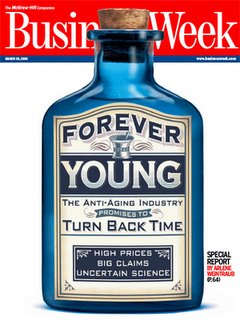
My eight-year old son said to me the other day ‘Dad, I don’t ever want to die’. I had to agree with him – I don’t ever want to die either and the longer I believe I can live in reasonably good health the better I’ll feel now. But as I have no faith in religion, suspect cryonics-type techniques will not work for quite a quite a while yet (I was fairly impressed with its endorsement by Thomas Donaldson when I did a maths unit of his at the ANU in 1976), and, no, I could never stick to a rigid calorie-restriction regime, which does however have bizarre, uncomfortable, live-lengthening potential.
Exercise does seem to be life-extending (studies here) but not remarkably so. What about drugs such as hormones? These are the billion dollar rage in the US these days. ‘Will pills and potions help?’ An article in the Online Business Week Forum, Selling the Promise of Youth by Arlene Weintraub summarizes what is known.
Main points
77 million US baby boomers are now approaching retirement and the new field of anti-aging medicine is greedily racing to keep up with us. Anti-aging doctors seek to turn back the internal hands of time by prescribing human growth hormone (HGH), DHEA, antioxidant vitamins C and E, glucosamine, Omega-3 oils and more.
The American Academy of Anti-Aging Medicine (A4M) suggests the industry now pulls in $56 billion/year but there is little scientific data to support claims that any of these potions extend life or promote ‘rectangularization’ , or years of healthy living followed by a short, acute decline rather than a slow, triangle-like descent to the grave (here).
The supplements sold are not regulated and do not go through rigorous safety and efficacy testing. Some hormone products are made by pharmacists who may not be adhering to standards of consistency and purity as mass-market drug manufacturers.
HGH is a controversial supplement. Lately the anti-aging industry has latched on to HGH as a tool for boosting immunity, memory, heart function, muscle mass, and more. HGH can cost as much as $2,000 a month. There are claims HGH can cause cancer, high blood pressure, blood clots and structural changes in the hands and feet. As there's no exact science to diagnosing adult HGH deficiency prescribing doctors have lots of leeway. Moreover, again, there is no evidence it works, as Dr Steven Barrett’s Quackwatch.org points out.
Many anti-aging advocates have an almost cult-like faith. What's missing is any firm scientific proof that these regimens actually slow down or reverse aging. A scientific study would have to span several decades and include a control group that's taking a placebo. It would be difficult to devise such a trial given the moral issues involved in dispensing what you know is a placebo. .
Chelation therapy involves infusing a patient with chemicals believed to bind to toxic metals and clear them out of the body. It is expensive and unproven. Again Barrett’s Quackwatch.org debunks the treatment.
There might be some valuable placebo effects in some (or all) of these treatments but in the main they look like attempts to cash into the fears of baby boomers like myself who just don’t want to die.
Religion is a cheaper placebo and probably safer!



6 comments:
I think you'll find that the studies examining calorie restricted diets were also done on mice (perhaps they have expanded them to other animals of late). It would be bad luck (and not really surprising) if the results didn't generalize to humans.
How to make sure you get to grow old?
Have the right parents.
-Restricted diets?
I thought he answer to that one was that a calorie-resricted diet didn't allow you to live longer - it just feels like it!
In Catch-22 one character (my copy is somehow out of reach) tries to make life seem as boring as possible so to make it seem longer (and likes people around him for this purpose). Want to live (like you are living) longer? Schedule more meetings - the more pointless the better!
There's something wrong with that line Anon. If you are a utilitarian you will more reasonably want to maximise perceived life length (L)*average pleasure (P) (I'll leave out discounting) and your perception of length of life is a decreasing function of P say L(P). So you wish to maximise PL(P) with respect to P. Your suggestion is to choose a very low P to maximise L(P). It is easily seen that this is wrong. You will choose as level of pleasure where the elasticity of perceived life with respect to pleasure equals -1. (where L'P+L = 0). In general this might mean going for much less punitive life styles.
This is the reason I endorse LesleyM's view. A highly restricted calorie diet would so reduce the average pleasure of my life I would not want it.
http://hgh-hormone.info
it sounds good
http://www.webspawner.com/users/fsaturn/
I like the sound of this porduct
Post a Comment